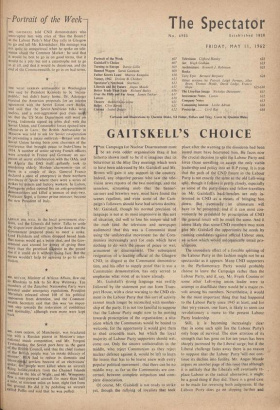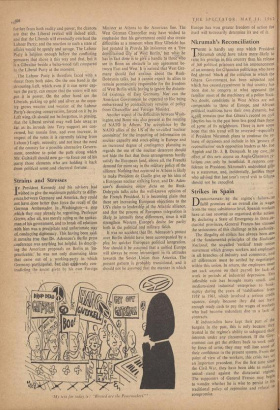GAITSKELL'S CHOICE
THL Campaign for Nuclear Disarmament must be an even odder organisation than it has hitherto shown itself to be if it imagines that its behaviour at the May Day meetings which were to have been addressed by Mr. Gaitskell and Mr. Brown will gain it any support in the country. Indeed, any objective person who saw the tele- vision news reports of the two meetings, and the senseless, screaming mob that the banner- carriers and brawlers were, must have found the scenes repellent, and even some of the Cam- paign's followers should have had serious doubts. Mr. Gaitskell, though his normal precision of language is not at its most impressive in this sort of situation, did well to lose his temper and tell the mob (and the television and newspaper audiences) that this was a Communist stunt using the unilateralist movement (as the Com- munists increasingly are) for ends which have nothing to do with the .issues of peace or war, armament or disarmament. The subsequent resignation of a leading official of the Glasgow CND, in disgust at the Communist demonstra- tion, and his offer to supply proof that it was a Communist demonstration, has only served to emphasise what most of us knew already.
Mr. Gaitskell's qtrong language was swiftly followed by the statement put out from Trans- port House, with a clear warning to the CND ele- ment in the Labour Party that this sort of activity cannot much longer be reconciled with member- ship of the party. It is not too fanciful to suppose that the Labour Party ought now to be moving towards proscription of the organisation; a situ- ation which the Communists would be bound to welcorrie, for the opportunity it would give them to shed crocodile tears, but Which the loyal majority of Labour Party supporters should wel- come too. Only the sincere unilateralists in the middle, who reject Communism as they reject nuclear defence against it, would be left to learn the lesson that has to be learnt anew with every popular political movement: that there can be no middle way, as far as the Communists are con- cerned, between complete subjection and com- plete dissociation.
Of course, Mr. Gaitskell is not ready to strike yet, though the rallying of loyalists that took place after the warning to the dissidents had been issued must have heartened him. He faces now the crucial decision to split the Labour Party and force those unwilling to accept the only viable leadership and policy into an ILP rump. It is true that the path of the CND fissure in the Labour Party is not exactly the same as the old Left-wing Split, though it follows it pretty closely, especially as some of the party-liners and fellow-travellers on Mr. Gaitskell's back-bencbes are only in- terested in CND as a means of bringing him down. But eventually an ultimatum will have to be presented; and if it can most con- veniently be presented by proscription of CND the general result will be much the same. And it seems likely that some CND members may soon give Mr. Gaitskell the opportunity he needs by running candidates against official Labour ones, an action which would autcjrnatically entail pro- scription.
The immediate effect of a forcible splitting of the Labour Party in this fashion might not be as spectacular as it appears. Many CND supporters in the Parliamentary Party would probably choose to leave the Campaign rather than the Labour Party, and if, say, Mr. Frank Cousins or some other Left-wing union leader were to attempt to disaffiliate there would be a major re- volt among his members. Nevertheless, it would be the most important thing that had happened to the Labour Party since 1945 at least, and for that very reason, one fears, is likely to seem too revolutionary a move to the present Labour Party leadership.
Still, it is becoming increasingly clear that in some such split lies the Labour. Party's only hope of survival. The slow attrition of its strength that has gone on for ten years has been sharply increased by the Liberal surge; but if the Liberal challenge fades away there is no reason to suppose that the Labour Party *will not con- tinue its decline into futility. Mr. Angus Maude argues on another page of this issue that although it is unlikely that the Liberals will eventually re- place Labour as the radical alternative, it might be a good thing if they did. There is a good case to be made for reversing both judgments. If the Labour Party does go on slipping further and further from both reality and power, the chances are that the Liberal revival will indeed stick, and that the Liberals will eventually overhaul the Labour Party; and the reaction to such a state of affairs would be speedy and savage. The Labour Party is helpless enough before the conflicting pressures that shove it this way and that, but it is a Gibraltar beside a balsa-wood raft compared to the Liberal Party at the moment.
The Labour Party is therefore faced with a threat from both sides. On the one hand is the devouring. Left, which. even if it can never cap- ture the par(y, can ensure that the voters will not put it in power. On the other hand are the Liberals, picking up gold and silver as the copn- try grows wearier and wearier of the Labour Party's decaying conservatism, forced on it by its Left wing. (It should not be forgotten, in,passing, ,that the Liberal revival may well fade away, as ,far. as its . inroads into Tory support are con- cerned, but remain firm, and even increase, in respect of the votes it is currently taking from Labour.) Logic, necessity, and not least the need or the country for a possible alternative Govern- • .ment, combine to point the path along which Mr. Gaitskell should, now go—to force out of his ,party those elements who are holding it back from political sense- and •electoral fortune.



































 Previous page
Previous page